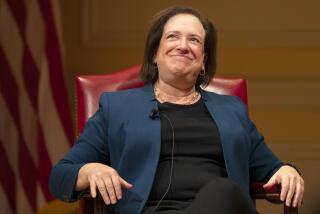California wins EPA waiver on greenhouse emissions
WASHINGTON — The Environmental Protection Agency will announce today that it is granting California’s request to impose tough restrictions on greenhouse gas emissions from cars and trucks -- reversing the Bush administration’s position and opening the way for the state to take the lead on global-warming policy.
California developed the standards in 2004 but was barred from implementing them.
EPA officials say granting California the waiver from federal standards gives the state wide latitude to promulgate stricter rules, restoring a 40-year interpretation of the Clean Air Act.
“It preserves California’s role as a leader on clean air policy,” particularly on motor vehicles, EPA Administrator Lisa Jackson said in an interview. “It feels good to know that we are able to move past -- address -- this issue, responding to the president’s call.”
President Obama had criticized the Bush EPA’s denial and, shortly after his inauguration, ordered the agency to revisit it.
California Gov. Arnold Schwarzenegger called the decision a “huge step for our emerging green economy that will create thousands of new jobs and bring Californians the cars they want while reducing greenhouse gas emissions.”
Sen. Barbara Boxer (D-Calif.), a longtime advocate of the waiver, said the EPA did “what is right for the people of California, the environment and the many states in the union that intend to follow California’s lead in cleaning up tailpipe emissions.”
But critics said the EPA should not give up federal control of climate policy.
“California already has experience in adopting differential regulations for gasoline and electricity,” said Scott Segal, an attorney for Bracewell and Giuliani in Washington, which represents utilities and refiners on climate change policy. “In each case, the results have been high prices for consumers, small businesses, schools, hospitals and industry. The precedent set here for cars could be just as damaging.”
Today’s decision sets the stage for the proposed national vehicle emissions standards that Obama announced in May: New cars and trucks sold in the U.S. will be required to improve their fuel efficiency gradually over the next seven years, reaching an average of 35.5 miles per gallon by 2016 -- a 40% improvement over the current 25 mpg level. The federal government agrees to adopt California’s standards as its own, and the state agrees not to toughen the standards before 2017. Automakers agree to drop lawsuits against California’s standards.
Agreement on the national standards came after intensive negotiations between the administration, California, environmentalists and the auto industry.
In the future, California could petition the EPA to set even stricter emissions standards, which probably would be granted on the legal grounds that the administration reaffirmed in granting this request.
“Congress recognized that California could serve as a pioneer and a laboratory for the nation in setting new motor vehicle emission standards,” Jackson wrote in today’s decision. “Congress intentionally structured this waiver provision to restrict and limit EPA’s ability to deny a waiver, and did this to ensure that California had broad discretion in selecting the means it determined best to protect the health and welfare of its citizens.”
The original Clean Air Act, passed in the 1960s, included a provision that allowed California to seek permission to set its own tougher standards. Other states could adopt California’s rules or stick with the federal government’s.
Spurred by a 2002 state law, California adopted standards for tailpipe emission of greenhouse gases, which scientists blame for climate change. The state petitioned to enforce them under the Clean Air Act, and a dozen other states lined up to adopt them.
But late in 2007, President Bush’s EPA denied the request -- the first time in more than 50 instances that the agency had rejected an entire set of proposed California standards.
Stephen L. Johnson, EPA administrator at the time, said California had failed to demonstrate that the standards were necessitated by “compelling and extraordinary conditions” as required by law, because global warming was not an extraordinary threat to the state compared to the country as a whole.
Obama’s EPA disagreed. Jackson, the current administrator, said today’s decision stemmed from a careful reading of the Clean Air Act and EPA history.
“This decision was based entirely on the law,” she said, “and not at all on politics.”
Longtime advocates of the waiver cheered Monday night.
State Sen. Fran Pavley (D-Agoura Hills), who wrote California’s 2004 emissions law, took a break from state budget negotiations to share a celebratory bottle of non-alcoholic Pinot Noir with colleagues.
“For our state, it’s quite a victory,” she said, “and for the coalition we had working on this bill back when global warming wasn’t the issue of the day.”
--
More to Read
Get the L.A. Times Politics newsletter
Deeply reported insights into legislation, politics and policy from Sacramento, Washington and beyond. In your inbox three times per week.
You may occasionally receive promotional content from the Los Angeles Times.










